
This article first appeared in City & Country, The Edge Malaysia Weekly on December 25, 2017 - December 31, 2017
The property industry has traditionally been seen as a man’s world. A closer look, however, shows that women are increasingly playing a bigger role in growing the industry and contributing to the country’s property needs. Be it in architecture or property consultancy, the fingerprint of women is becoming more visible.
The higher participation of women in the labour force (38.3% in 2015; 38.6% in 2016) augurs well for Malaysia as it edges towards becoming a developed nation where all citizens contribute to its success. To increase this number, a paradigm shift is needed and also an understanding of the challenges women face and how they overcome them.
City & Country asked eight professional women involved in the real estate industry to talk about the work they do and the lessons they have learnt over the years.

Carrie Fong, Hedgeford Sdn Bhd director and Rehda Youth chairperson
Coming from an advertising background, Fong ventured into property development when she joined Glomac Bhd as its group marketing manager in 2005 and consolidated various products with a consistent brand identity. She later headed the marketing team at Malaysia Property Inc — a real estate government-linked initiative. In 2011, she was appointed director of Hedgeford Sdn Bhd, which has a track record in industrial, residential and mixed developments.
Fong is also a founding member of the Real Estate and Housing Developers’ Association (Rehda) Malaysia Youth branch and is its chairperson for the 2016 to 2018 term.
“I think as a female generally in the professional world, you tend to be underestimated. One way to overcome this is to make sure you know your stuff, go out on site and talk to people.
I also learnt how to balance my life and work from my previous female bosses. One of the challenges is balancing the different roles I have to play and it is okay if not everything is perfect. At certain stages of your life, you can prioritise what is needed to be done. Also, with medical advancement, women have more control over their bodies and this empowerment allows them to plan their careers, families and how they want to manage their lives.
As for who inspires me, it is my father (Glomac Bhd group executive vice-chairman Datuk Richard Fong). I take a lot of cues from him. He still continues to surprise me at how he can see business opportunities or have a vision of what is possible. When I look at something, I see roadblocks, but he can see past them. I think that is due to experience in the industry. I also learn from him how he deals with people and how he listens.
Others who have inspired me include the bosses I worked with over the years. One boss was in his sixties when I met him, and you’d think someone his age would not be tech savvy. But he was more tech savvy than any of us.
Every Monday morning, when we had our management meeting, he would come in with a new piece of tech information and a new challenge. So, every week we were getting challenged in what we could do and what could be done. After working on it, we would succeed!
My advice in general to women entering property development is to find that balance between work, career, family and personal. There should be more awareness of wellness and mental well-being.
I believe there will be different priorities at different times in a woman’s life and it is okay to tilt towards one direction. You should not beat yourself up. I think women spend a lot of time beating themselves up. We put so much guilt on ourselves, saying things like, ‘I’m not a good mother’ or ‘I’m not a good worker’. I think we need to know our priorities.
As chairperson of Rehda Youth, I wanted to enhance the association. Rehda Youth follows the acronym LEAD, where L is for leadership, E for education through our study tours and Future Forward Forums, A for aid such as doing CSR and D for design.
My focus is on education … and I thought what we should be doing is to champion the future, in the sense of how we can advance in terms of our construction and property development knowledge.
That is why I wanted to do the Future Forward Forum — to tap the expertise of overseas developers and consultants because I find that they are ahead, especially in the cities, where the population is large. They are at a more mature stage of wealth distribution and population. So, you see the trends and some of the product innovations that they are already doing. Sooner or later, these will definitely come to Malaysia. With Future Forward, we want to tap their expertise and experience to get a glimpse of what we might do now or what we can plan for in the future.”
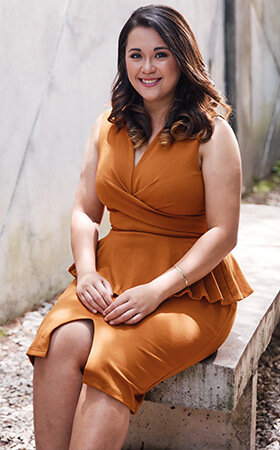
Jayne Kennedy, COO of Epic Collective and co-founder of Epic Homes
Kennedy has a Bachelor of Arts in Creative Advertising and Graphic Design from Curtin University, Malaysia, and co-founded Epic — a non-profit organisation to build sustainable homes for the underprivileged communities — in 2010. Her passion is to unlock, harness and connect like-minded individuals to build a community of change-makers. Last year, Epic introduced Epic DNA, its experiential learning arm that equips people with skills to impact the communities around them. It also introduced EPIC Communities, a community-driven developer to bring people together to build cooperative, resilient and sustainable communities.
“This career of mine started with an opportunity to bring ordinary people together to do one extraordinary thing: to build a home with a man who didn’t have one. As we laboured side by side, I was struck by the authenticity of the people around me; how united we were despite being so different, how much we learnt from each other and how much we ‘unlearnt’ in the process. But most of all, I was inspired by the sheer number of people who stepped forward, wanting to share their knowledge, resources, skills and time. And seven years later, I’m still inspired!
Our work revolves around people — bringing forward the strengths of their communities while facilitating opportunities for them to shape the places and spaces around them. I have a growing sense of responsibility towards the people and communities we work with. The more I learn, the better I become, the better I can serve the people around me. And if everyone is able to be his best self, I believe it would fundamentally change the way people cooperate and collaborate.
My career choice has been a constant learning experience. Going in at a young age without any background or knowledge in the field was both a strength and a weakness. It allowed us to come up with ideas and test boundaries because we weren’t limited or weighed down by expectations and not having the knowledge pushed, and continues to push, us to find relevant advisers and experts in the field, some of whom are now close friends and mentors.
As for any negative perception or discrimination as a woman doing what I do, to be honest, nothing that I can think of. I think it is the nature of our [Epic’s] work. There are perceptions that women can’t be as involved because they are seen to be physically weaker, or perhaps have a lower tolerance for working outdoors or ‘getting dirty’ but we find that in our projects, we usually have 60% women and 40% men involved!
My advice to those considering going into this field is that whatever you choose to do, know why you do it because this will guide the decisions you make. One thing I want to highlight is that we have a responsibility to the people we work for and those we work with, and these decisions ripple outwards and affect more than just what we see on the surface. In the words of [African-American, Pulitzer Prize-winning novelist] Alice Walker, ‘Look closely at the present you are constructing: it should look like the future you are dreaming’.”

Y Y Lau, country head of JLL Malaysia
After spending several years in accountancy and finance, Lau, an accountant by training, decided that her true passion was real estate. As a result, she obtained her real estate qualification and joined the property industry. In 1995, she founded YY Property Solutions, focusing on office and local residential leasing. In 2014, her company tied up with JLL group. The business now deals with leasing, capital markets, international residential, research and consulting. Clients include both Malaysian and multinational companies.
“I personally don’t feel there have been too many barriers to my success. I think I’ve had good partners and mentors along the way, which helped a lot. But certainly, there are not that many visible female leaders in real estate in Malaysia, so one of the challenges is that there are too few role models for women who want to make it their profession. To have more women in the industry, we need to start early — at school and university. I’d love to see more women doing real estate-related degrees, such as urban planning or surveying.
At JLL, it’s a priority to create and sustain a work environment that fosters diversity and inclusion — and gender diversity is a big part of that. We recognise that having a range of experiences, backgrounds and perspectives allows us to find new ways of doing things, which means we can deliver the best possible services to our clients.
I think the challenges came before I ever got into real estate. I come from a very conservative background where women were expected to get married and raise a family rather than have a career. Things are very different now, though, and there are so many smart and talented young women who have the confidence and ability to become business leaders. It’s great to see.
I started in real estate after having had a first career in accountancy. It meant that I was very determined to succeed because I knew what I wanted. I had, and still have, a real passion for this profession.
“Now, as a business leader, I realise the importance of creating diverse teams that include people of different backgrounds and with different perspectives. This enables us to be client-focused and provide really high quality service. That’s the key to winning the trust of your clients and building your reputation.
In terms of character, my late parents influenced me a lot. I appreciate their simple, honest values and I try to hold true to those today. I really believe that if you work smart and hard enough, you’ll do well. I’m also inspired by my team at JLL — their energy and enthusiasm is infectious.
My No 1 piece of advice for future female leaders is enjoy what you do. Life is short, so it’s important to stay positive and focused. From experience, I know that being optimistic, resilient and adaptable is absolutely key when you’re running a business. We live in a world of constant change and that is challenging but you have to embrace it and enjoy being ‘happily stressed’.”
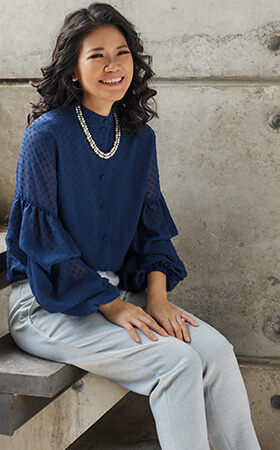
Lee Yoke Har, executive director of IOI Properties Bhd
Lee graduated with a Bachelor of Laws with honours from King’s College, London, and is a barrister-at-law (Middle Temple). She also holds a diploma in finance and accounting. Lee joined IOI Group as a legal executive in 1996 and was later transferred to the property division to implement the International Organisation for Standardisation quality management systems. She then assumed various positions at IOI Properties and in 2010, she was promoted to senior general manager for marketing and business development. Lee is responsible for managing and implementing the marketing and sales strategy for Klang Valley projects and overseeing the product design development department.
“I grew up in a very traditional family where certain activities were deemed unsuitable for a girl. And in the real estate industry, there are indeed aspects that are deemed inappropriate for a woman. For example, climbing cat ladders, working under harsh weather and physical conditions on a construction site filled with hidden hazards such as holes in the floor slab and fallen objects. Although I didn’t encounter prejudicial treatment from men, especially the younger ones who are accustomed to viewing women as their equals, there are indeed physical differences that could pose a problem in the course of carrying out our work.
It was later in my career that I took the opportunity to dabble in the operational aspects of the business. I started to get involved, from managing business processes to ensuring compliance with ISO requirements, managing the sales and marketing functions, monitoring product quality controls and assurance at the site and taking responsibility for the product development process. I strove to prove myself when faced with adverse situations. I learnt that the knowledge that I acquire will always stay with me and people acknowledge your efforts, your know-how and respect your professionalism eventually, regardless of gender or position. It is not true that you have to prove more if you are a woman.
My father inspires me with his leadership by example and his walk-the-talk philosophy. He is 70 plus, yet he goes to the construction sites a few times a day when he has the time, regardless whether it is the weekend.
There are also many of my colleagues who multitask and inspire me by working with their hearts. I also know a few women leaders in the industry who have succeeded solely on their own merits. The many women chancellors, prime ministers, business leaders and social work leaders are testament to the fact that gender inequality is only in our minds and that we should not let this self-imposed constraint hamper what we want to do.
Another person who has influenced me deeply is the founder of Tzu Chi, a Taiwan-based international humanitarian organisation known for its great international disaster relief work. This lady can move hundreds of volunteers, including tycoons, to not just donate money but also devote their time to humanitarian work.
My advice to future female leaders would be to put aside the notion that ‘I am a woman and hence I have to work doubly hard to prove myself compared with my male counterparts’. Tell yourself instead that ‘I have to put in the extra hours to learn the trade’ as does everyone else who wants to excel regardless of their gender. Put your feminine attributes of patience, compassion and an eye for detail to good use. As women, perhaps we have more roles to juggle as we have to take care of our parents, our own families and our career simultaneously, which could take a toll on us. However, with good time management and by prioritising and working longer hours, we can get a lot of things done.
What is needed is a support system, including childcare facilities, so we can work with peace of mind and society’s perception that women can be economically productive and possess attributes that can address the human side of things, for example, deeper employee and customer engagement, which is important for the success of a business.”
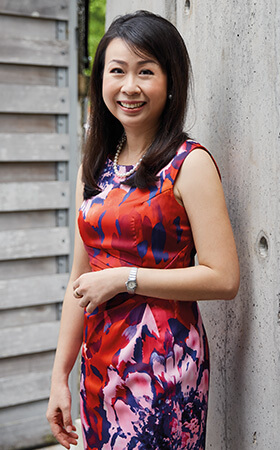
Leong Kit May, CEO of Axis REIT
Leong is a qualified accountant with stints in Ernst & Young and the UOA group of companies. In 2005, she was part of the team that was instrumental in listing UOA REIT. In 2006, she joined Axis REIT Managers Bhd and during her tenure there, she was promoted to chief financial officer and subsequently appointed as executive director. In 2012 and 2013, she led the launch of Axis REIT’s first Islamic medium-term notes (sukuk) programme worth RM300 million. The sukuk was upsized to RM3 billion in early 2015. Groomed to take over as CEO in the company’s succession plan, Leong eventually took the post last year.
“There are many challenges as a woman to rise to my position. For a start, juggling between work and family is challenging. It was never easy but I have had great bosses and colleagues who helped and worked with me along the way. In the past, it was quite common to hear some say ‘this is a man’s world’, at least in the real estate space. But I thank God that I have been able to gain the trust of my bosses and colleagues in the past 10 years and meet the challenges handed to me.
As for who inspires me, to be honest, it is not so much who inspired me as what inspired me. I come from a humble background. There was always need for extra money. Growing up was not easy and I was the eldest of four. My parents wanted a better education for all of us, so that we could all have a better life. In a way, you can say my parents were my inspiration.
The advice I would give future female leaders is that in any career or profession, no matter at which level you are, the most important attribute is good attitude plus some ambition. I guess in this generation, women are lucky. If we had been born 50 years ago, we might not be having this conversation. But in this current generation, we are lucky to be given equal employment opportunities and be better recognised to take up leadership posts. So, work hard and seize every opportunity.
I never imagined myself in a male-dominated profession. I was ambitious but that’s because I wanted a better quality of life for my family and parents. I only envisaged myself being an accountant or CFO after I graduated. But I would say that my accounting qualification provided me with a financial perspective in dealing with business and charted the foundation of my experiences. One thing led to another and I am blessed to be where I am today.
For female leaders to rise, one must take note of the spark of opportunity and seize it at the right time with a vision and goal in mind. Whether or not to seize the opportunity when it comes will be a personal decision. Everyone is given a choice. Some may choose to stay put in their career even when an opportunity is offered to them while some may have to give up their jobs in order to tend to their home and children. There are no right or wrong choices and certain decisions are dictated by circumstances. Having said that, to be a leader, one must first have the vision and goal and when an opportunity arises, have the courage to look forward and take up the challenge.”
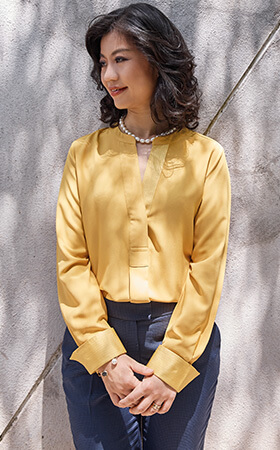
Charmaine Lim, executive director of Titijaya Land Bhd
Lim joined the family business as a marketing executive in 2003. Titijaya was founded by her father and its group managing director Tan Sri Lim Soon Peng in the 1980s. In 2007, she was promoted to sales and marketing director in charge of carrying out marketing and promotional activities for ongoing and new development projects for the group. She recalls how she found her calling to work in the property development industry while being involved in her project — E-Tiara serviced residences — in Subang Jaya. In 2010, she was appointed executive director of the group.
“While I believe that men and women are like two sides of the same coin, where each has his unique charisma and a different approach to things, it is undeniable that a degree of gender discrimination does exist. Consciously and unconsciously, a man has always been perceived as the breadwinner of a household and the woman, the homemaker. In addition, women are more likely to be described as ‘supportive’, ‘collaborative’ and ‘helpful’ in performance reviews while men are more likely to have words like ‘drive’, ‘transform’, ‘innovate’ and ‘tackle’ in their reviews. As a woman in the management line, I hope that we can be recognised for our talent and skills instead of gender.
I would say that the real challenge lies within us, women. We are still caught up in the unconscious traditional mindset that men will always lead big corporations. I’d like to take this opportunity to reach out to my fellow women — be yourself and be confident of your capabilities.
It is not easy to find a balance between work and family, to be frank. Nevertheless, as women, we have to be brave in order to become the best versions of ourselves. With that said, we also shouldn’t be fixated on striking a balance. Instead, we should be ready to face whatever challenges that arise. Life is just like that — it won’t be as perfect as we wish.
For me, one way to overcome challenges at work is to be clear about what I want, analyse the situation well and seek advice. After making it clear to the team about what I seek to achieve with the task, I quickly move on with it. We must not quit or give up easily. Nothing should be seen as a stumbling block as these lessons and experiences are part and parcel of achieving success.
My father is my inspiration. He has inspired me to give my all in everything I do, be it in my career, ways of dealing with things or my philosophy of life. Another person who inspires me a lot is Sheryl Sandberg, who is an American technology executive, activist, and author as well as the current COO of Facebook. She speaks about gender equality and fighting for women’s rights, and I recommend her first book, Lean In: Women, Work, and the Will to Lead, co-authored by Nell Scovell. You will learn ways to achieve career goals and it is also helpful for men who want to contribute to a more equal society.
I applaud the prime minister’s move to include initiatives on female empowerment in Budget 2018. Under the new policy, government-linked companies, government-linked investment companies and statutory bodies have to allocate 30% of positions on their boards to women by the end of next year.
As a woman, you must focus on what you are passionate about. You also need a team and a workplace that will support you to grow. We must erase the perception that women are to stay at home while men are the ones who go out to work. Women deserve to have their own careers and develop a life they desire.
I hope to see more women lead and be involved in their own businesses in the future. This will not only benefit the family but also society as a whole.”
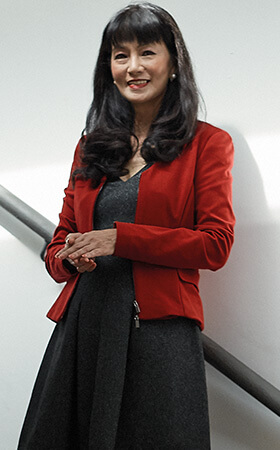
Datuk Tan Pei Ing, principal of PI Architect and past president of PAM
Tan graduated with a Bachelor of Architecture from the University of Melbourne. At 28, she set up PI Architect as a sole proprietor. Today, the firm has a workforce of 30. Known for her tenacity and passion for architecture, Tan is fondly called the “Iron Lady”. Projects that she has been involved in include the IOI Business Park, clubhouses, serviced apartments, shops, office buildings, industrial buildings, the Marriott Hotel in Putrajaya and, most recently, IOI City Mall. In 2001, she was elected president of the Malaysian Institute of Architects (PAM), the first female president in its history.
“I was born shortly after Malaysia’s independence. My childhood was marked by a time of great economic transition and a period of rapid nation building. I marvelled at the fast-paced growth and I could see the skyline transforming. So I developed an intense fascination for the built environment. Architecture, being a combination of arts and science, is a creative and constructive profession. It has the power to shape the environment we live in, greatly impacting society and the characteristics and landscape of our nation, and I wanted to be part of that process.
What drives and motivates me is loving what I do, the commitment to excel and to being able to make a difference. I always advocate that no matter where you are and what you do, if you have the passion, success will follow. Hard work, positivity and passion are the building blocks of success.
I feel that there is more to life than enriching yourself monetarily and I owe a filial responsibility to give back to the industry that taught me. As an individual, we have little power but as a group, collectively, we can help shape the direction of the profession and that motivated me to get actively involved in both the local and international organisations.
Being a woman in the industry that is considered male-dominated, I have gone through my fair share of gender discrimination. When I returned to Malaysia in the mid-1980s after I completed my Bachelor of Architecture in the University of Melbourne, the country was going through recession. I had difficulty in getting a job as many perceived that ladies were incapable of handling rough construction sites. I continuously encountered gender bias and stereotyping from all sectors during my career. My passion for architecture helped me overcome these hurdles and my desire to excel pushed me and I persevered. I had to work much harder to prove my capabilities and earn respect. My tough journey helped me build my strength and resilience.
I am an active advocate of gender equity and for advancing women in architecture. I drafted the Khartoum Declaration on Gender Equity in Architecture, which was adopted by the International Union of Architects this year. We desire to promote the culture of inclusion and want the industry to recognise the importance of the contribution of female architects to the built environment.
My advice to those wanting to enter architecture is that professionalism, passion and integrity are very important, and you must always give your best. Respect is earned, not demanded. Set the sky as your limit. Be good in what you do and always strive for excellence. Constantly upgrade yourself to stay competitive and to meet new challenges. Build on your strength and acknowledge and overcome your weaknesses. Nothing in life comes easy and you must be prepared to put in hard work. Stay passionate and committed and believe what you are doing. Determination, persistence and perseverance will pay off.”
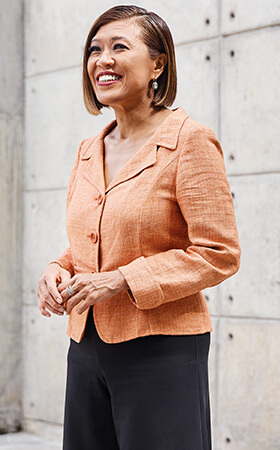
Lillian Tay, principal and director of Veritas Design Group
Her love for arts, maths and physics saw Tay complete a Bachelor of Engineering and Master’s of Architecture at Princeton University, in the US. She then worked for Kohn Pedersen Fox Associates in New York City for three years, returned to Malaysia in 1991 and joined Veritas as a principal in 1995. Projects undertaken by Tay and her team include the DiGi.Com headquarters in Shah Alam, the Brunei Embassy in Beijing and Souk Al Kabeer in Dubai. Their involvement in Menara Binjai in Kuala Lumpur saw the project being named the Cityscape Dubai Best Sustainable Development (Built) in 2012, and their refurbishment work on Sinkeh Hotel in George Town, Penang, earned Veritas PAM’s Building of the Year award.
“It is a challenge for women to rise to my position, as much as I hate to admit it, but the workplace and world of business are generally biased towards men. This is from centuries of social and cultural conditioning and is deeply entrenched in most Asian communities. I face the typical challenges, that a woman needs to perform better than a man to prove herself and to gain trust and respect, especially in a male-dominated industry. Like it or not, the way of doing business revolves around a social culture of male bonding, the ‘hey bro’ camaraderie and bravado that has been cultivated over years. It’s always a bit harder for women to break into male-dominated circles in the leadership of many industries.
I’d like to think that it just drives women to work harder to excel and often while carrying the larger burden of family responsibilities. Women, whether out of choice or necessity, simply work harder and longer hours, if only to compensate for external less favourable circumstances. We learn to be more resilient, persevering, tolerant and even more thick-skinned. Even on day-to-day banalities, I try to avoid falling into stereotype expectations, like I would not be caught dead wearing soft pink. I am tall and I relish wearing high heels and never try to be shorter.
Whenever I go to a place where I see a conspicuous gender disparity in the ordinary workforce where mainly women are working, like in the rice fields of Bali, among the street vendors of Vietnam, in the garment factories of Bangladesh or in the Kota Bahru market, I am inspired by the tenacity, determination and enterprise of every ordinary woman, even those less privileged, less educated.
My advice to future female leaders is that I believe female leaders today have a responsibility to try harder to identify, rectify and promote greater gender parity in the workplace, in institutions where they work or which they serve, and in schools and universities. Also, to constantly nurture and drive a culture of excellence in their respective jobs, industry or business. Women must particularly and earnestly support other women, simply to right the centuries of prejudice that has created the deep-seated disparity in perception and attitudes that are ‘invisible’ obstacles to many women aspiring to succeed in their jobs.
There is a lot more we can do in Malaysia to ensure more gender equality, to empower and get more women up to leadership roles and to reduce the gender pay gap, which is a reality that exists in the workplace here.”
Save by subscribing to us for your print and/or digital copy.
P/S: The Edge is also available on Apple's App Store and Android's Google Play.
